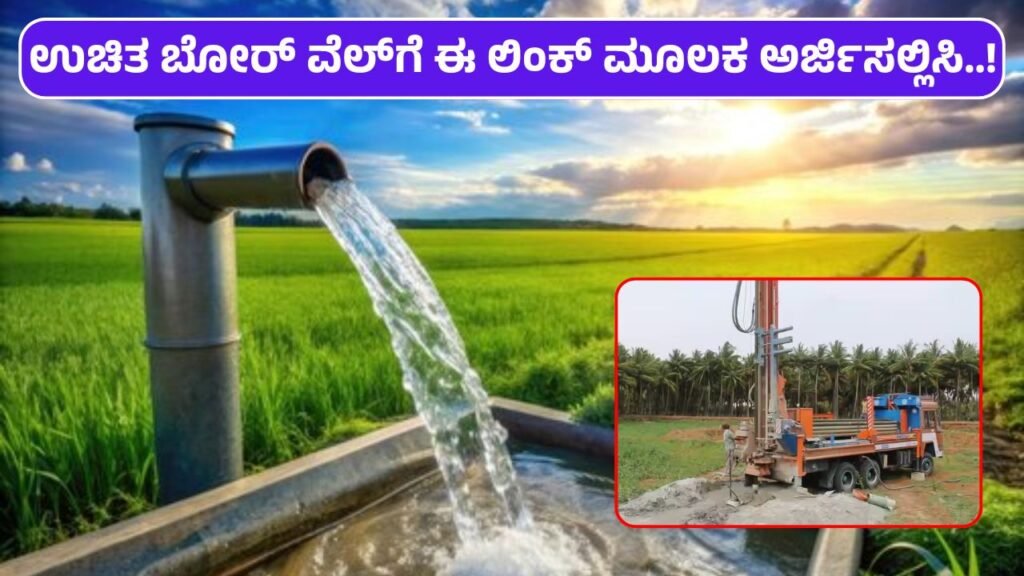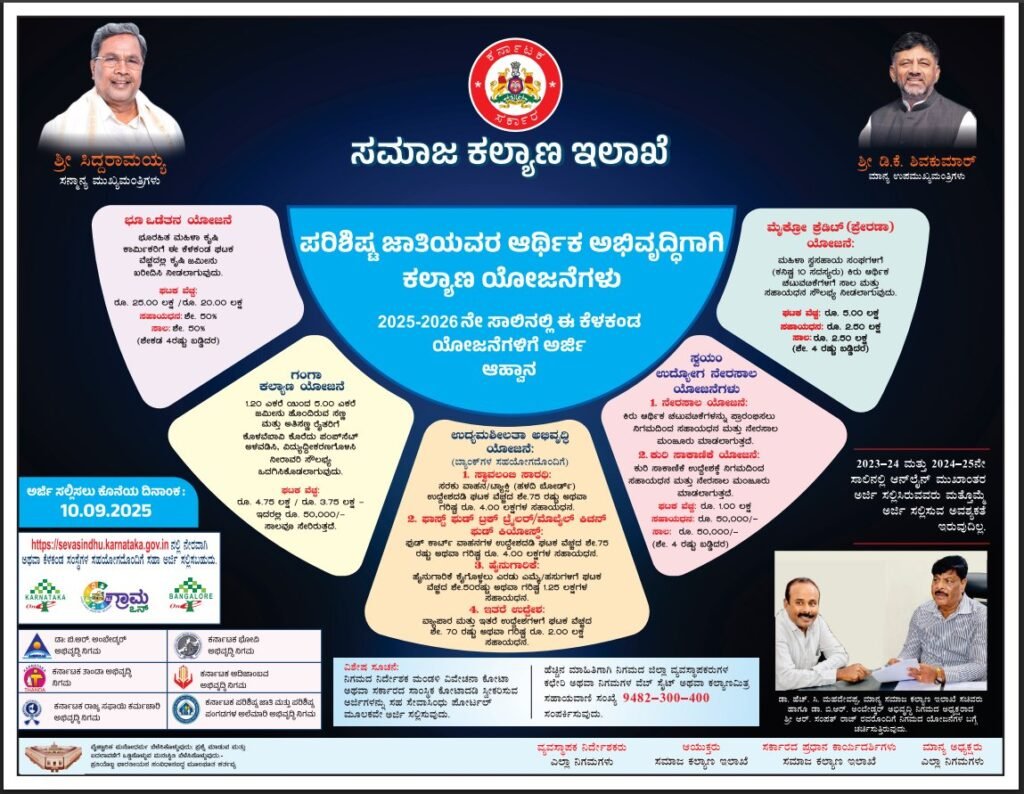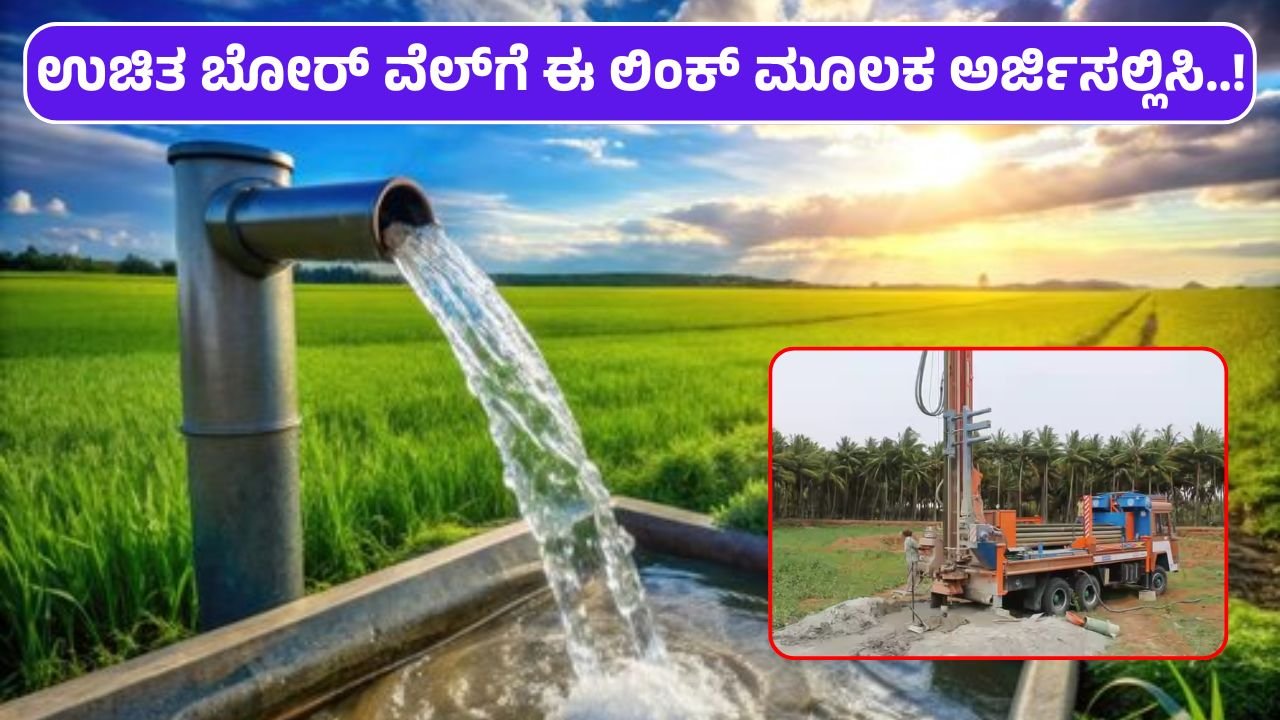Introduction:
One of the Karnataka government’s landmark initiatives to support marginal and disadvantaged farmers is the Free Borewell Scheme, more formally known as the Ganga Kalyana Scheme. This scheme seeks to ensure sustained irrigation by providing borewells (or open wells), pump sets, and necessary electrification to farmers at heavily subsidized cost or free of charge—reshaping irrigation access across rural Karnataka.

1. Objective & Beneficiaries
The core aim of the Ganga Kalyana Yojane is to alleviate water scarcity for small and marginal farmers, particularly those who have no access to existing irrigation systems. It targets farmers belonging to minority communities, SC, ST, and various backward classes, offering infrastructure support for irrigation where monsoon reliability is low
2. Who Can Apply? Eligibility Criteria
Eligibility requirements vary slightly across districts and implementing bodies, but generally include:
- Landholding size: Between 1.20 acres to 5 acres (small or very small farmers)
- Annual family income: Typically capped at ₹1.5 lakh for rural applicants; around ₹2 lakh for urban applicants
- Social category: Applicants must belong to SC, ST, OBC, or minority communities and comply with specific development corporations responsible for their group
- Additional conditions: In some variations (e.g., 2025 updates), applicants must be 18–55 years old, not employed in government services, and Karnataka residents

3. Benefits Provided
Depending on land size and district, the scheme offers a range of benefits:
- Borewell or open-well drilling, pump set installation, and electrification—often fully subsidized
- Financial support amounts vary:
- Up to ₹3.5 lakh in districts like Bengaluru Urban, Rural, Ramanagara, Kolar, Chikkaballapur, and Tumkur
- Around ₹2–₹2.25 lakh in other districts
- Some sources cite ₹1.5 lakh to ₹3.5 lakh subsidies
- Unit costs considered under subsidy reach ₹4 lakh for up to 8 acres and ₹6 lakh for up to 15 acres, but most recipients are smallholders
- In Bengaluru and surrounding zones, the total project might cost ₹4.75 lakh, with electrification cost of ₹75,000 borne by ESCOMs; other districts see total costs closer to ₹3.75 lakh, and some recipients receive low-interest ₹50,000 loans at 4% interest
4. Application Process
The scheme is administered by multiple development corporations, including those for SC, ST, minorities, Vokkaligas, Lingayatas, and others
- Application channels: Through Seva Sindhu portal, Karnataka One / Bangalore One centers, or respective local Gram Panchayats and Taluk offices
- Required documents: Typically include caste and income certificates, land records, Aadhaar, bank passbook, ration card, small-holder certificate, and self-declaration forms
- Process: After submission, eligibility is verified, technical assessments ensure feasibility, and approved applications proceed to execution via drilling and electrification
- Deadlines: For example, in the 2023–24 cycle, last date was 3 October 2023 Dates for current cycles must be checked on official portals.
5. Impact & Challenges
Benefits:
- Ensures reliable irrigation and reduces sole dependence on monsoon.
- Enhances crop yield diversity, increases farmer income, and fosters rural economic stability
- Spurs rural employment through drilling and installation activities.
Challenges:
- Potential for groundwater depletion due to overdrilling.
- Maintenance issues: pump sets and systems may face neglect or lack of servicing
- Administrative hurdles, delays, and uneven execution across districts are possible.
Conclusion
The Ganga Kalyana Scheme, Karnataka’s Free Borewell initiative, stands as a vital welfare measure enriching small and marginalized farmers across the state. By offering borewell infrastructure and electrification—often free—it enables sustainable agriculture and economic resilience. However, groundwater management, system upkeep, and transparent, timely execution remain essential to ensure its long-term success and environmental sustainability.
